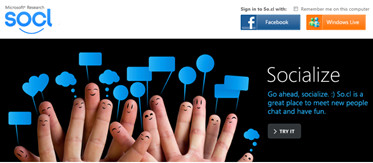When 'Thefacebook' first launched in February 2004, access was initially restricted only to students of Harvard University where Mark Zuckerberg was a student. Facebook went on to become something of a success, with the social network controversially being valued at more than $100 billion.
 Microsoft must have been watching from the sidelines, wondering when and if it could join the social networking revolution; conscious of how it was relatively late to embrace both the Internet and search bandwagons but still able to make more than a little impact when it did. Google limped into the social networking space with Google+, which has still really to make the kind of splash that those in Mountain View would have hoped for. So why would Microsoft think it could do any different, any better?
Microsoft must have been watching from the sidelines, wondering when and if it could join the social networking revolution; conscious of how it was relatively late to embrace both the Internet and search bandwagons but still able to make more than a little impact when it did. Google limped into the social networking space with Google+, which has still really to make the kind of splash that those in Mountain View would have hoped for. So why would Microsoft think it could do any different, any better?
Truth be told, Microsoft has already been following the Facebook route by going down the well-trodden path of targeting students and restricting the invite only access to those based at universities and schools in the US. Sounds familiar huh? Now it has taken the leap from restricted to global, by launching the Microsoft So.cl social search network to the general public no matter where they happen to live or work. You can, apparently, "share your search and express your ideas" says Microsoft "through beautiful collages of content" which seems to mean that it's aimed at sharing search results, commenting upon them and as a result building a network of like-minded people to interact with.
But it isn't, despite the whole student to global evolution thing, aimed at destroying Facebook market share. In fact, it's a social network that integrates with Facebook and appears to have more to do with bolstering the Bing search brand as competing with Facebook. Indeed, you sign in using your Facebook account (or MS Live ID) and waste more of your time indulging in YouTube video viewing parties and liking the results of searches made by your social circle. It's a way of sharing interests, sure, but if you already share content via Facebook, Twitter or even Google+ then I'm not really sure what So.cl is meant to bring to the party other than an opportunity for Microsoft to claim it has not been left behind by techno-cultural changes. That claim may be valid, but Microsoft cannot make one based upon techno-cultural innovation: So.cl is just the same old, same old wrapped up in different marketing materials. Actually, scrap that. It's the same old, same old but a cut down, low fat and lower usefulness variety of it.
As Eden Zoller, a Principal Analyst at Ovum, says "Microsoft So.cl is not a fully-fledged social network and it is far too early to even suggest it could be a rival to Google+ or Facebook, and the chances are it never will be. So.cl is powered by Bing and is about social search and sharing, with little value add beyond this and no-where near the kind of features offered by Facebook or Google+. If So.cl gains significant traction, which we think unlikely, then Microsoft might well ramp up the service with additional features, particularly mobile where Microsoft can tap into the Windows Phone platform. But for now So.cl will most likely remain an experiment at heart..."
